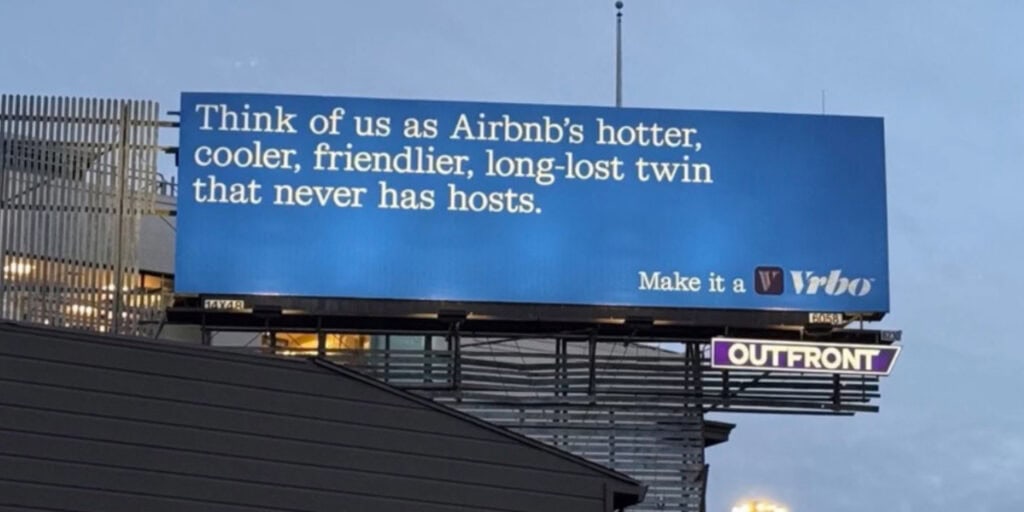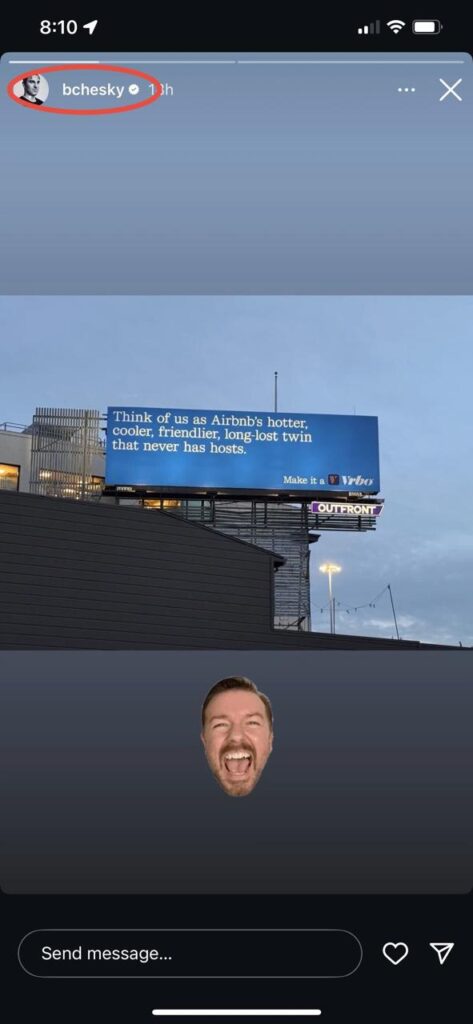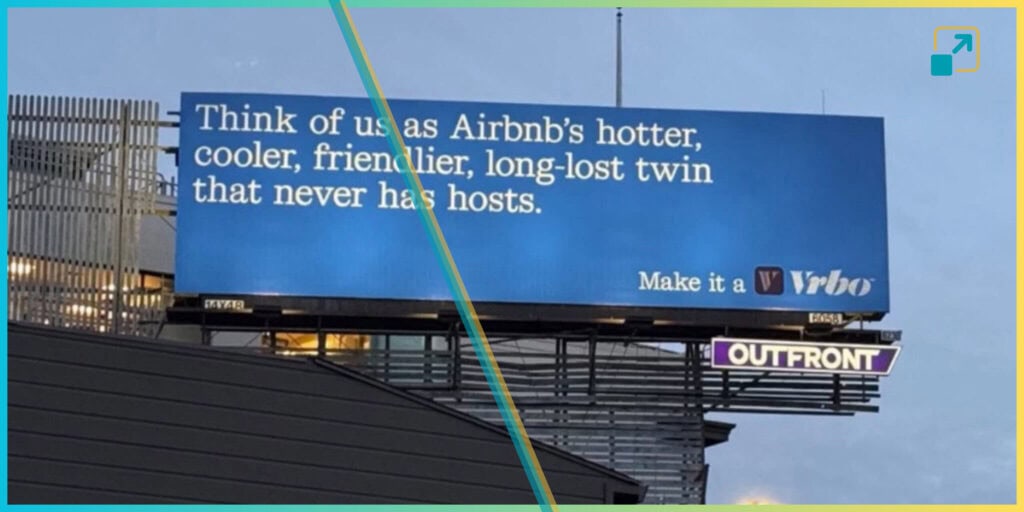Vrbo’s latest billboard campaign has turned heads, not just for its bold placement in cities like New York and San Francisco—but for strategically positioning a billboard directly across from Airbnb’s San Francisco headquarters. The message?
“Think of us as Airbnb’s hotter, cooler, friendlier, long-lost twin that never has hosts. Make it a Vrbo.”
This guerrilla-style campaign is not a one-off stunt—it’s part of a larger marketing push that will expand to major U.S. cities, including Atlanta, Los Angeles, Chicago, Dallas, Houston, Charlotte, and Tampa. The goal? To firmly establish Vrbo as the go-to alternative to Airbnb for whole-home stays.
But while the ad succeeds in grabbing attention and sparking conversation, does it truly resonate in 2025’s advertising landscape?

Source: (Bee Travel News)
What Works: Smart Disruption & Conversational Tone
Strategic Disruption & Free PR
The placement of the billboard near Airbnb’s San Francisco headquarters didn’t go unnoticed—Airbnb CEO Brian Chesky posted a photo of it to his Instagram Stories, drawing even more attention to the campaign. This kind of reaction fuels the narrative Vrbo is trying to create: that it’s a worthy competitor getting under Airbnb’s skin. The move generated organic conversation, boosting Vrbo’s visibility even further.

Conversational, Playful Tone
The casual, social-media-friendly phrasing—“hotter, cooler, friendlier, long-lost twin”—is a departure from traditional corporate-sounding ads. In an era where brands like Duolingo and Ryanair thrive on irreverence and humor, Vrbo taps into the trend of personality-driven marketing.
Visually Aligned with Modern Trends
2025 ad trends emphasize bold typography and visual simplicity, ensuring messages land even when glanced at for mere seconds. Vrbo’s billboard design leans into this trend, making the message easy to spot in high-traffic areas.
Strong Contrast with Airbnb
Vrbo effectively highlights its differentiator: no shared spaces, no on-site hosts. The ad plays off Airbnb’s biggest guest complaints—unexpected interactions with hosts and lack of privacy—without explicitly mentioning them.
Where Vrbo’s Billboard Falls Short
Assumes Prior Knowledge of Vrbo
If someone unfamiliar with Vrbo sees the ad, the copy doesn’t clearly explain what Vrbo actually is. While it differentiates from Airbnb, it doesn’t tell a new audience how to book, what types of properties are available, or why they should trust the platform.
This is a Pattern, Not a One-Off Strategy
Vrbo’s reliance on positioning itself as the anti-Airbnb is not new. This pattern extends beyond billboards into its broader marketing strategy.
- The recent Nick Saban commercial also emphasized host-free stays, reinforcing the message that Vrbo is different from Airbnb.
- Past Vrbo ads have leaned into humor at Airbnb’s expense, such as commercials where guests accidentally book a farm overrun with chickens or a home with an unexpected host interaction.
- While differentiation is important, this repeated comparison means Vrbo risks defining itself only in contrast to Airbnb, rather than building its own unique brand identity.
Lacks the Authenticity Consumers Demand in 2025
Research shows that modern consumers—especially Gen Z—crave authenticity over polished corporate marketing. While Vrbo’s ad is playful, it still feels brand-driven rather than real.
The Copy is More Clever Than Clear
Too Many Adjectives in a Row → Meaning Gets Lost
- “Think of us as Airbnb’s hotter, cooler, friendlier, long-lost twin that never has hosts.”
- This stacked list of descriptors makes it hard to parse what the key message is.
- What’s the most important takeaway here? Is Vrbo hotter? Cooler? Friendlier? No hosts?
- The punchline—“never has hosts”—is buried at the end when it should be upfront.
The “Twin” Analogy is Confusing
- Calling Vrbo a “long-lost twin” suggests similarity, but the rest of the sentence is about how Vrbo is different from Airbnb (cooler, friendlier, no hosts).
- Are they the same or are they different? The analogy creates unnecessary friction in understanding.
The Wording is a Problem
The phrase “that never has hosts” is ambiguous and could be misinterpreted as Vrbo having no hosts at all—which, obviously, is not the case. This is another example of how the syntax unintentionally obfuscates meaning.
Literal Interpretation: Someone unfamiliar with Vrbo might think, Wait, does this mean Vrbo doesn’t have hosts at all? Does that mean:
- Vrbo owns all the properties itself? (It doesn’t.)
- Vrbo operates like a hotel? (It doesn’t.)
- Vrbo has no individual property owners? (It does.)
Intended Meaning vs. Possible Meaning
- What Vrbo likely meant: “You’ll never stay with a host on-site.” (i.e., only entire homes)
- What some people might think: “Vrbo has no property owners or managers.”
No Emotional Pull or Storytelling
2025 ad trends emphasize emotional connection over pure differentiation. Brands succeeding today—whether in B2C or B2B—are leaning into story-driven messaging. While Vrbo’s billboard makes a direct contrast, it doesn’t evoke a feeling.
Why Vrbo Keeps Comparing Itself to Airbnb
Vrbo’s positioning strategy—consistently framing itself as the superior alternative to Airbnb—is a classic challenger brand approach. This tactic works in some ways but has limitations.
- Market Dominance of Airbnb – Airbnb is the category leader in short-term rentals, commanding more brand awareness and media coverage. Vrbo doesn’t have the luxury of being the default choice, so it leans into differentiation.
- Clear Unique Selling Proposition (USP) – Vrbo’s core differentiator is its entire-home model—no shared spaces, no on-site hosts, and a focus on families and groups. Contrasting this against Airbnb, which has both shared and private listings, makes its message stronger.
- Customer Confusion – Many travelers lump all vacation rental platforms together. Vrbo’s messaging clarifies what sets it apart.
- Playbook of Established Rivalries – Brands like Pepsi vs. Coke or Samsung vs. Apple have successfully positioned themselves as the “better” alternative to dominant players. Vrbo is using a similar strategy.
What Works About This Approach
- Simple, Clear Messaging – By directly contrasting itself with Airbnb, Vrbo doesn’t need to over-explain its benefits. Consumers immediately understand: “Vrbo = Whole homes. Airbnb = Maybe a shared space.”
- Targets Airbnb’s Weaknesses – Airbnb has struggled with guest frustrations around shared spaces, surprise fees, and inconsistent quality. Vrbo capitalizes on this.
- Resonates With Families & Groups – Large-group travelers want privacy, and Vrbo repeatedly drives home the message that it’s the best platform for them.
What Doesn’t Work
- Shadow Branding Problem – By consistently referencing Airbnb, Vrbo reinforces Airbnb’s status as the category leader. A truly dominant brand wouldn’t need to compare itself to a competitor.
- Lack of Emotional Connection – Airbnb has successfully cultivated an emotional appeal through storytelling (e.g., “Belong Anywhere,” user-generated experiences). Vrbo’s ads focus on features rather than emotional resonance.
- Short-Term Effectiveness – Positioning against a competitor can work for a campaign, but it doesn’t build long-term brand identity. Vrbo still lacks a distinct personality compared to Airbnb.
- Misses Other Competitive Threats – The industry is evolving, with direct bookings and niche platforms rising. A relentless focus on Airbnb might cause Vrbo to overlook other emerging trends.
Why This Matters for Professional Short-Term Rental Managers
If you’re a professional short-term rental manager, you might wonder: Why should I care about Vrbo’s billboards? While it may seem like just another marketing move, there are important takeaways for operators:
- Branding Lessons: Vrbo’s campaign highlights both the power and pitfalls of comparative advertising. If you rely too heavily on differentiating yourself against a competitor rather than establishing your own unique brand, you risk reinforcing the competitor’s dominance. If you’re marketing your portfolio to guests or homeowners, how can you communicate value without relying on comparisons?
- Platform Positioning & Revenue Impact: Vrbo is aggressively pushing its whole-home, host-free message to compete with Airbnb. As a professional manager, this means Vrbo is actively courting travelers who prefer professionally managed listings over shared spaces. Understanding how Vrbo’s marketing aligns with your inventory strategy can help you decide where to list and how to optimize your messaging.
- Listing Strategy Considerations: If Vrbo is investing in national brand-building while Airbnb continues refining its personalization and AI-driven search results, the competition between platforms will only grow. Are you diversifying your listings effectively across platforms to reduce dependency on any one OTA?
- Guest Perception & Expectations: Vrbo’s messaging signals a clear expectation shift among travelers—they are being conditioned to expect entire-home stays, no on-site hosts, and seamless experiences. If your portfolio includes co-hosted or smaller-unit rentals, you might need to adjust how you frame your properties to match evolving traveler preferences.
- Owner Relations & Acquisition: If Vrbo’s campaign is successful, it could draw more homeowners who prefer hands-off property management. This could work in favor of professional managers looking to grow their inventory. Are you prepared to capture homeowners who align with Vrbo’s marketing angle?
Vrbo’s Ad Grabs Attention, But Misses Depth
Vrbo’s billboard campaign is undeniably disruptive and well-placed, generating buzz and reinforcing its differentiator against Airbnb. However, in the context of 2025’s evolving ad landscape, it lacks the authenticity, emotional engagement, and action-driven clarity that define successful modern advertising.
More importantly, Vrbo’s ongoing strategy of defining itself in contrast to Airbnb risks becoming a crutch. While differentiation is key, its messaging has repeatedly leaned on ‘we’re not Airbnb’ rather than forging a distinct identity beyond just host-free stays.
Ultimately, visibility is not enough—modern consumers expect brands to connect, engage, and inspire action. If Vrbo wants to translate its bold branding into real conversions, it needs to evolve beyond cleverness into something that feels personal, authentic, and emotionally compelling.
To truly capitalize on the attention its billboards are generating, Vrbo should refine its messaging:
- Clarify the unique selling point upfront. Instead of a convoluted analogy, a direct statement like “Only whole homes. No live-in hosts. No surprises.” would be clearer.
- Own its legacy. Vrbo actually predates Airbnb by 13 years, yet many travelers assume it’s a newer competitor. Leaning into its credibility as a long-established platform could add trust and differentiation.
- Encourage action. Instead of just making a statement, direct viewers to visit the site, book a stay, or learn more.




![Trump-Era Policies Fuel Travel Uncertainty: Fewer Canadians, Europeans to U.S.—Fewer Americans to Europe [Early Data]](https://www.rentalscaleup.com/wp-content/uploads/2025/04/Trump-Era-Policies-Fuel-Travel-Uncertainty-Fewer-Canadians-Europeans-to-U.S.—Fewer-Americans-to-Europe-Early-Data-150x150.jpg)



